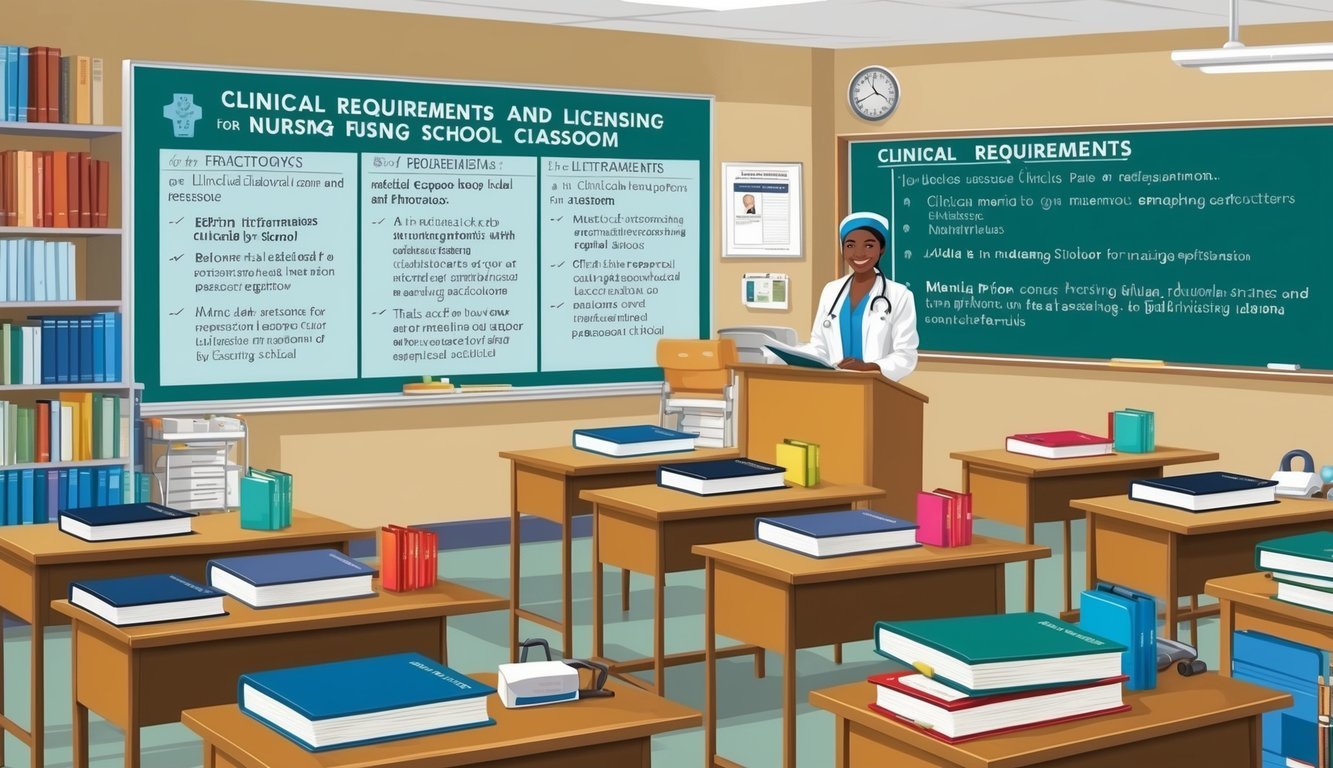If you’re considering a career in nursing, you’re likely wondering about the commitment involved in attending nursing school.
Nursing programs can range from around 2 to 4 years, depending on the type of degree you pursue.
Different pathways lead to various nursing roles, including Registered Nurse (RN), Nurse Practitioner (NP), and more specialized positions.
For those looking for a quick entry into the field, an Associate Degree in Nursing (ADN) typically takes about 2 years.
If you aim to earn a Bachelor of Science in Nursing (BSN), you should expect to invest approximately 4 years.
Advanced degrees, such as a Master of Science in Nursing (MSN), can require an additional 2 years after completing a BSN.
Understanding how long it takes to become a nurse can help you plan your educational journey more effectively.
Whether you’re interested in accelerated programs or traditional routes, knowing your options will ensure you make informed decisions about your future in healthcare.
For more detailed information about nursing programs and requirements, visit Nurse.org and RNcareers.org.
Understanding Nursing Education Pathways

Embarking on a nursing career involves navigating various educational pathways, each designed to meet specific professional goals.
Here’s a breakdown of common nursing degrees:
| Degree Type | Duration | Role |
|---|---|---|
| Associate Degree in Nursing (ADN) | 2 years | Prepares you to become a Registered Nurse (RN) |
| Bachelor of Science in Nursing (BSN) | 4 years | Provides access to advanced positions and specialties |
| Master of Science in Nursing (MSN) | 2 years after BSN | Enables roles such as Nurse Practitioner (NP) or Clinical Nurse Specialist |
| Licensed Practical Nurse (LPN) | 1 year (approx.) | Provides basic nursing care under the supervision of RNs |
You can start your nursing career with an ADN, which offers a quicker route to becoming a Registered Nurse.
Many hospitals prefer a BSN for better job prospects and leadership roles.
The MSN degree expands your opportunities, allowing you to specialize and influence patient care policies.
It is particularly advantageous if you aspire to work as a Nurse Practitioner.
Associate and Bachelor’s Degree Programs
Choosing between an Associate Degree in Nursing (ADN) and a Bachelor of Science in Nursing (BSN) is crucial for your nursing career.
Each program has distinct timelines, prerequisites, and career implications.
Associate Degree in Nursing (ADN)
An ADN program typically takes 2 years to complete and is often offered at community colleges.
It provides the foundational education needed for entry-level nursing positions.
Prerequisites may include courses in biology, anatomy, and chemistry.
Once you complete the ADN, you’ll be eligible to take the NCLEX-RN exam, which is necessary for becoming a registered nurse.
The focus of ADN programs is primarily on clinical skills and nursing competencies.
Graduates usually find employment in hospitals, long-term care facilities, and clinics.
Advantages of ADN:
- Shorter program length
- Lower tuition costs compared to BSN programs
Bachelor of Science in Nursing (BSN)
A BSN program generally spans 4 years and is available at universities and some colleges.
It provides a more comprehensive education, including leadership, research, and community health.
To enroll in a BSN program, you typically need to meet certain prerequisites such as higher-level math and science courses.
After completing your degree, you can take the NCLEX-RN for licensure.
BSN graduates often have more opportunities for advancement and specialized roles in nursing.
Many employers prefer BSN nurses for management positions due to their extensive training.
Benefits of a BSN:
- Broader scope of practice
- Better job prospects and career advancement opportunities
| Degree Type | Duration | Key Focus | Prerequisites |
|---|---|---|---|
| ADN | 2 years | Clinical skills | Basic biology and chemistry courses |
| BSN | 4 years | Leadership and research | Advanced math and science courses |
Advanced Nursing Degrees

Advanced nursing degrees enhance your qualifications and expand your career opportunities.
These programs prepare you for specialized roles in healthcare, combining clinical expertise with leadership skills.
Master of Science in Nursing (MSN)
The Master of Science in Nursing (MSN) is a critical step for registered nurses seeking advanced practice roles.
This degree typically requires 1-3 years to complete, depending on your prior education.
With an MSN, you can pursue various specialties, including Nurse Practitioner (NP), Clinical Nurse Specialist (CNS), and Nurse Educator.
Many MSN programs focus on nursing leadership, which prepares you to manage teams and influence healthcare policies.
Courses often cover advanced clinical practices, research methods, and healthcare systems.
Upon graduation, you will be eligible for board certification in your chosen specialty, which is necessary for advanced practice roles.
Doctor of Nursing Practice (DNP)
The Doctor of Nursing Practice (DNP) is the highest level of nursing education aimed at practice rather than research.
Programs typically take 2-5 years to complete, depending on your foundational degree.
DNP graduates are equipped for leadership positions in various settings, including hospitals, clinics, and healthcare systems.
This degree focuses on evidence-based practice, organizational leadership, and systems management.
A DNP can also lead to roles such as Certified Registered Nurse Anesthetist (CRNA) or Advanced Practice Registered Nurse (APRN).
Many programs emphasize improving healthcare outcomes and reducing disparities.
Pursuing either an MSN or DNP can significantly enhance your career potential and expertise in nursing.
For more guidance, explore reputable resources like Nurse.org for detailed program insights.
Alternative and Accelerated Paths

If you’re looking for ways to enter the nursing field quickly, alternative and accelerated paths can offer effective solutions.
These options allow you to leverage your existing credentials and expedite your education.
LPN to RN/BSN Programs
LPN to RN or BSN programs are designed for Licensed Practical Nurses (LPNs) who want to advance their careers.
These bridge programs recognize your prior nursing education and experience, allowing you to complete your RN or BSN in a shorter timeframe.
Typically, these programs can be finished in 12 to 24 months, depending on the school and your prior coursework.
Courses often cover advanced topics such as pharmacology, nursing ethics, and clinical practice.
Many institutions also offer online RN-to-BSN programs, which provide flexibility for working professionals.
You will benefit from clinical experience that prepares you for the changing demands of healthcare.
Schools may offer accelerated options to help you transition quickly into registered nursing.
Accelerated BSN Programs
Accelerated BSN programs are ideal for individuals who already hold a bachelor’s degree in another field and want to become Registered Nurses (RNs).
These programs typically span 11 to 18 months and focus on intensive nursing education.
The curriculum includes core nursing courses and clinical practice, ensuring you gain the necessary skills for patient care quickly.
Most programs require completion of approximately 60-65 credits, depending on the institution.
Schools offering these programs, such as the University of Kentucky, have a strong emphasis on practical training.
These programs are fast-paced and can significantly reduce the duration of your nursing education compared to traditional routes.
Clinical Requirements and Licensing

To become a registered nurse (RN), you must complete clinical requirements as part of your nursing education.
This typically includes a specified number of clinical hours and practical training.
Clinical Hours and Rotations
Most nursing programs require you to complete between 500 and 1,200 clinical hours.
This hands-on experience allows you to apply your skills in real healthcare settings.
Your clinical rotations may cover various specialties, including pediatrics, geriatrics, and critical care.
Clinical Skills
During your clinical training, you will develop crucial skills that are essential for patient care.
Some of these skills include:
- Patient assessments
- Medication administration
- Wound care
- Basic life support
Licensing
After finishing your nursing program, you must pass the NCLEX-RN (National Council Licensure Examination for Registered Nurses) to obtain your RN license.
This exam evaluates your knowledge and competency in nursing practices.
If you hold a Licensed Practical Nurse (LPN) license, you can often pursue an LPN-to-RN bridge program, which may have different clinical hour requirements.
Career and Further Opportunities in Nursing

A nursing career offers various pathways tailored to your interests and goals.
You can choose from several nursing tracks, including:
- Registered Nurse (RN): Requires a diploma, ADN, or BSN.
- Nurse Practitioner (NP): Requires an MSN or higher degree.
- Clinical Nurse Specialist: Also requires an MSN.
Each pathway provides unique opportunities for career advancement and specialization.
The demand for nurses continues to grow, resulting in numerous nursing jobs across settings.
Opportunities exist in hospitals, clinics, research institutions, and schools.
The evolving healthcare landscape has expanded roles, making nursing practice multifaceted.
You may find career opportunities in areas such as:
- Nursing Research: Focuses on advancing healthcare practices.
- Nursing Education: Involves teaching future nurses.
Average annual salaries vary based on your specialization and location.
For example:
| Nursing Role | Average Annual Salary |
|---|---|
| Registered Nurse | $75,000 |
| Nurse Practitioner | $110,000 |
| Clinical Nurse Specialist | $95,000 |
To enter this field, make sure you meet the admission requirements for your chosen nursing program.
These typically include a high school diploma or equivalent, prerequisite courses, and standardized test scores.
For more insights on nursing pathways, you can explore resources like Nurse.org and RN Careers.

